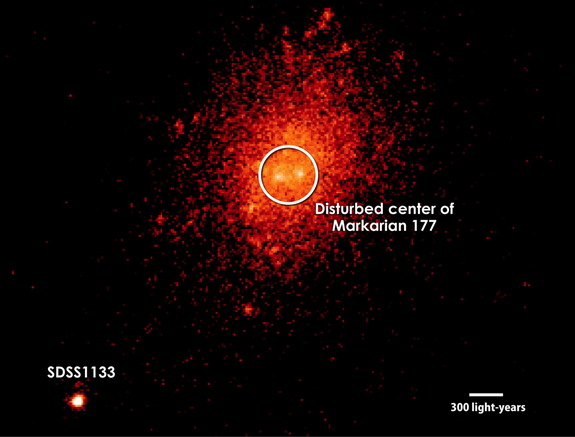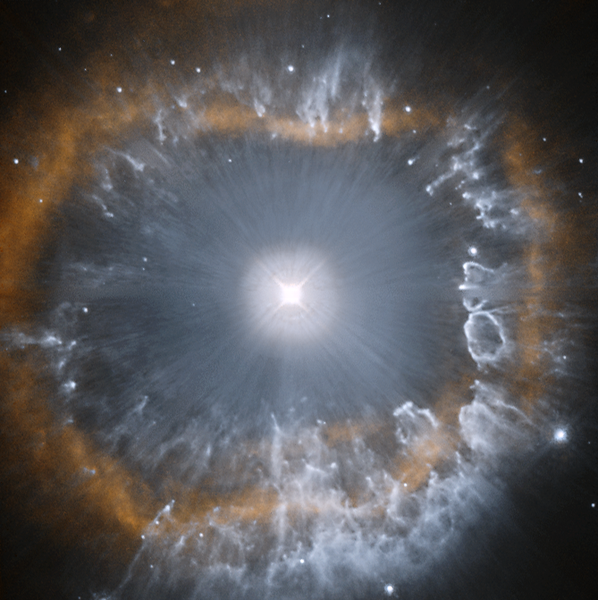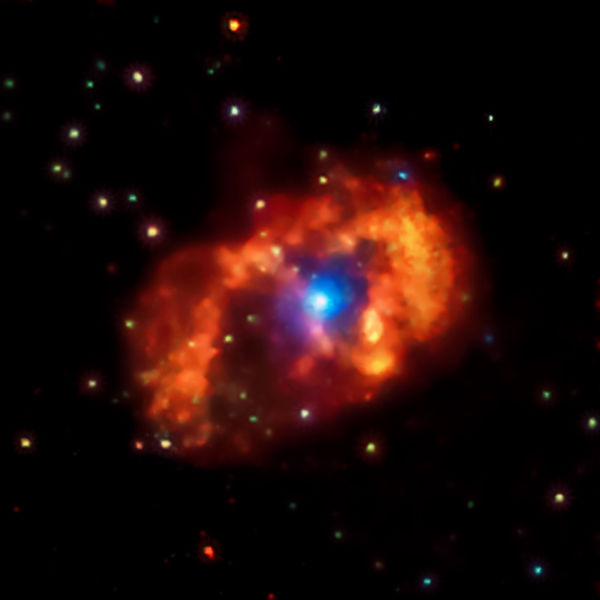It looks like you're using an Ad Blocker.
Please white-list or disable AboveTopSecret.com in your ad-blocking tool.
Thank you.
Some features of ATS will be disabled while you continue to use an ad-blocker.
share:
There is something strange near dwarf galaxy Markarian 177.

Well, near as in it's around 2,600 light years away from Markarian 177.
SDSS1133 has astronomers scratching their heads as they are not quite sure what exactly it is.
Michael Koss started looking at SDSS1133 back in 2010. What his research turned up was shocking:
Article at Space.com
Supernovas brilliant light tends to be very short lived, the longest tend to fade within weeks. Here, instead, was an object that was staying brilliant for six decades.
Because Markarian 177 is a result of colliding dwarf galaxies, a more appealing hypothesis now is that the two dwarf galaxies that collided, ejected their central black holes after they merged, and have traveled to where they are now, over 2600 lightyears away.
Which is it? A supernova that is defying how supernovas that we have observed going even centuries back behave? Or a massive black hole that has left it's parent galaxy and is now traveling intergalactic space?
There maybe a way for astronomers to find out:
There is a third option: SDSS1133 may be a LBV, or a Luminous Blue Variable.

AG Carinae HD 94910
A LBV is a massive evolved stars that show unpredictable and sometimes dramatic variations in both their spectra and their brightness. They can undergo massive eruptions making them quite bright. However, if SDSS1133 is a LBV, it has been erupting longer than any LBV that we have observed before.

Eta Carinae
In any case, SDSS1133 is certainly going to be unique.

Well, near as in it's around 2,600 light years away from Markarian 177.
SDSS1133 has astronomers scratching their heads as they are not quite sure what exactly it is.
Michael Koss started looking at SDSS1133 back in 2010. What his research turned up was shocking:
Koss, a postdoctoral fellow with the Swiss National Science Foundation, started looking at object SN in 2010. Previous observations indicated that SDSS1133 was a supernova, a star that had reached the end of its fuel supply and exploded in a brilliant flash.
But Koss was shocked when he found archival images from the Pan-STARRS telescope going as far back as the 1950s, with SDSS1133 clearly visible in the sky. SDSS1133, whatever it is, has been shining brightly for over 60 years. No known supernova has ever burned for so long. And in the last six months, the object's started getting brighter. Normally supernovas release one brilliant flash and then dim.
Article at Space.com
Supernovas brilliant light tends to be very short lived, the longest tend to fade within weeks. Here, instead, was an object that was staying brilliant for six decades.
Because Markarian 177 is a result of colliding dwarf galaxies, a more appealing hypothesis now is that the two dwarf galaxies that collided, ejected their central black holes after they merged, and have traveled to where they are now, over 2600 lightyears away.
Which is it? A supernova that is defying how supernovas that we have observed going even centuries back behave? Or a massive black hole that has left it's parent galaxy and is now traveling intergalactic space?
There maybe a way for astronomers to find out:
To figure out if SDSS1133 is a black hole or a supernova, the researchers will look for the presence of a particular type of carbon atom, called carbon 4. The intensity of a black hole merger could create a high volume of carbon 4 in the surrounding material. Koss said the team should be able to observe the abundance of carbon 4 with observations made by the Hubble Space Telescope or the Chandra X-Ray Observatory.
There is a third option: SDSS1133 may be a LBV, or a Luminous Blue Variable.

AG Carinae HD 94910
A LBV is a massive evolved stars that show unpredictable and sometimes dramatic variations in both their spectra and their brightness. They can undergo massive eruptions making them quite bright. However, if SDSS1133 is a LBV, it has been erupting longer than any LBV that we have observed before.

Eta Carinae
In any case, SDSS1133 is certainly going to be unique.
Love this kind of stuff. There is so much out there we think we understand, then something like this happens to turn it all upside down. I'd give
almost anything to be alive 1,000 years from now, after we've developed interstellar travel and get to see all the wonders up close. Imagine getting
to watch a super nova from juuust far enough out to be safe.
SDSS1133, whatever it is, has been shining brightly for over 60 years. No known supernova has ever burned for so long. And in the last six months, the object's started getting brighter.
Maybe it's an alien laser cannon someone shot at us and every year it gets closer. That would explain why it gets brighter.
I'm counting the days.
a reply to: DAVID64
IF (and that's a big IF), Betelgeuse every goes supernova in our life times, you just might get your wish.
That's a big "if" though.
IF (and that's a big IF), Betelgeuse every goes supernova in our life times, you just might get your wish.
That's a big "if" though.
originally posted by: eisegesis
SDSS1133, whatever it is, has been shining brightly for over 60 years. No known supernova has ever burned for so long. And in the last six months, the object's started getting brighter.
Maybe it's an alien laser cannon someone shot at us and every year it gets closer. That would explain why it gets brighter.
I'm counting the days.
Now THERE is a good one!
Seriously.
I'm all about science....but I do love a good hypothesis that involves things like this.
How about: it's the mater/antimatter explosion of a planet sized starship?
a reply to: eisegesis
You read Protector, didn't you?
Actually, it's pulses from a Bussard ramjet. The spacecraft has performed turnover and is shedding velocity by directing it's thrust toward Earth.
Maybe it's an alien laser cannon someone shot at us and every year it gets closer. That would explain why it gets brighter.
You read Protector, didn't you?
Actually, it's pulses from a Bussard ramjet. The spacecraft has performed turnover and is shedding velocity by directing it's thrust toward Earth.
edit on 11/19/2014 by Phage because: (no reason given)
a reply to: eriktheawful
If you want to get freaky, how about light doesn't travel at all?
There is some type of mysterious energy wave, picking up momentum that excites particles into photons as it travels towards us.
If you want to get freaky, how about light doesn't travel at all?
There is some type of mysterious energy wave, picking up momentum that excites particles into photons as it travels towards us.
edit on
19-11-2014 by eisegesis because: (no reason given)
originally posted by: Phage
a reply to: eisegesis
Maybe it's an alien laser cannon someone shot at us and every year it gets closer. That would explain why it gets brighter.
You read Protector, didn't you?
Actually, it's pulses from a Bussard ramjet. The spacecraft has performed turnover and is shedding velocity by directing it's thrust toward Earth.
Oooooo! A Niven reader!
Hrmmmmm......actually Phage, that makes me remember a question I asked myself a LONG time ago, but never really looked into it:
Would a Bussard ramjet work in intergalactic space between galaxies?
a reply to: eriktheawful
Not as much stuff out there but with a large enough "net" I suppose it would. But by the time you left the Galaxy you'd be moving at a pretty good percentage of the speed of light anyway.
Not as much stuff out there but with a large enough "net" I suppose it would. But by the time you left the Galaxy you'd be moving at a pretty good percentage of the speed of light anyway.
What kind of radiation would two colliding black holes emit?
What kind of physics describes such a thing? quantum or otherwise?
Maybe its the event horizons coming our way......
What kind of physics describes such a thing? quantum or otherwise?
Maybe its the event horizons coming our way......
I would think that 6 decades in space time would virtually resemble a moment as we perceive it. Seemingly endless discoveries happening all the time.
The journey may never end, my friend. Great find!
originally posted by: stirling
What kind of radiation would two colliding black holes emit?
What kind of physics describes such a thing? quantum or otherwise?
Maybe its the event horizons coming our way......
Not sure on the physics of it, other than what Phage said (and you better be FAR, FAR away when it happens).
Oh, wait, I think the theory says there would be Gravity Waves too.
Above my pay grade. I'm just an amateur astronomer.
originally posted by: Phage
a reply to: eisegesis
Maybe it's an alien laser cannon someone shot at us and every year it gets closer. That would explain why it gets brighter.
You read Protector, didn't you?
Actually, it's pulses from a Bussard ramjet. The spacecraft has performed turnover and is shedding velocity by directing it's thrust toward Earth.
Nope, wrong age bracket. But your comment alone made me laugh.
From a comparison of the wavelength spectrum of the light emitted by SDSS1133 and a nearby dwarf galaxy the scientists concluded that the object might be a black hole that belonged to this dwarf galaxy at one stage and was jettisoned out of it.
I find this part fascinating...
Link
If two galaxies head towards each other in space and eventually collide, they merge into one. The two supermassive black holes in the centre of the two galaxies also fuse. In this process, if the general theory of relativity holds true, gravitational waves are formed and spread out in space. If the black holes have unequal masses or are spinning at different speeds, the gravitational waves will be emitted asymmetrically – giving the fused black hole a “kick” that propels it in the opposite direction. In some cases, this recoil kick is relatively weak and the fused black hole drifts back into the centre. In other cases, however, the kick is strong enough to propel the black hole out of the galaxy entirely, where it will forever wander through the universe.
edit on 19-11-2014 by eisegesis because: (no reason given)
a reply to: eisegesis
Age has nothing to do with it.
And you should, it's one of the best stories ever.
(Jaws theme)
Nope, wrong age bracket.
Age has nothing to do with it.
And you should, it's one of the best stories ever.
A roving black hole, devouring everything in it's path. Du duh...du duh....duh duh duh duh
In other cases, however, the kick is strong enough to propel the black hole out of the galaxy entirely, where it will forever wander through the universe.
(Jaws theme)
edit on 11/19/2014 by Phage because: (no reason given)
originally posted by: Phage
a reply to: eisegesis
Nope, wrong age bracket.
Age has nothing to do with it.
And you should, it's one of the best stories ever.
You're absolutely right. I have a hard time getting into fiction. I get lost in my own reality as it is.
It's definitely going onto my bucket list.
a reply to: Phage
Wouldn't that be relative to who is observing what and when, Or is Einsteins theory wrong?
Example,
If I was on the ship I may think I was stationary and the energy input into the engine is merely propelling the galaxy away from me and I probably wouldn't notice that was a woo/woefull point of view to hold until I suddenly started gaining extra mass due to relativistic speeds involved.
Wouldn't that be relative to who is observing what and when, Or is Einsteins theory wrong?
Example,
If I was on the ship I may think I was stationary and the energy input into the engine is merely propelling the galaxy away from me and I probably wouldn't notice that was a woo/woefull point of view to hold until I suddenly started gaining extra mass due to relativistic speeds involved.
a reply to: MarsKingAQuestion
You might think that but if you did you probably wouldn't have been able to build the ship in the first place.
If I was on the ship I may think I was stationary and the energy input into the engine is merely propelling the galaxy away
a reply to: Phage
No, the radiation type is merely a photon, which is a boson, as its frequency type changes the further it travels throughout the universe.
Is frequency radiation?
Now I know I am splitting hairs but I think you are a fan of technical jargon and might enjoy such a debate.
No, the radiation type is merely a photon, which is a boson, as its frequency type changes the further it travels throughout the universe.
Is frequency radiation?
Now I know I am splitting hairs but I think you are a fan of technical jargon and might enjoy such a debate.
new topics
-
Electrical tricks for saving money
Education and Media: 8 minutes ago -
VP's Secret Service agent brawls with other agents at Andrews
Mainstream News: 1 hours ago -
Sunak spinning the sickness figures
Other Current Events: 2 hours ago -
Nearly 70% Of Americans Want Talks To End War In Ukraine
Political Issues: 2 hours ago -
Late Night with the Devil - a really good unusual modern horror film.
Movies: 4 hours ago -
Cats Used as Live Bait to Train Ferocious Pitbulls in Illegal NYC Dogfighting
Social Issues and Civil Unrest: 5 hours ago -
The Good News According to Jesus - Episode 1
Religion, Faith, And Theology: 7 hours ago -
HORRIBLE !! Russian Soldier Drinking Own Urine To Survive In Battle
World War Three: 9 hours ago
top topics
-
SETI chief says US has no evidence for alien technology. 'And we never have'
Aliens and UFOs: 16 hours ago, 8 flags -
Florida man's trip overseas ends in shock over $143,000 T-Mobile phone bill
Social Issues and Civil Unrest: 12 hours ago, 8 flags -
Cats Used as Live Bait to Train Ferocious Pitbulls in Illegal NYC Dogfighting
Social Issues and Civil Unrest: 5 hours ago, 7 flags -
VP's Secret Service agent brawls with other agents at Andrews
Mainstream News: 1 hours ago, 6 flags -
Former Labour minister Frank Field dies aged 81
People: 14 hours ago, 4 flags -
Bobiverse
Fantasy & Science Fiction: 12 hours ago, 3 flags -
HORRIBLE !! Russian Soldier Drinking Own Urine To Survive In Battle
World War Three: 9 hours ago, 3 flags -
Nearly 70% Of Americans Want Talks To End War In Ukraine
Political Issues: 2 hours ago, 3 flags -
Sunak spinning the sickness figures
Other Current Events: 2 hours ago, 3 flags -
Late Night with the Devil - a really good unusual modern horror film.
Movies: 4 hours ago, 2 flags
active topics
-
The Real Reason Behind the Sean Combes Exposure
Political Conspiracies • 45 • : ThatSmellsStrange -
VP's Secret Service agent brawls with other agents at Andrews
Mainstream News • 14 • : lilzazz -
Electrical tricks for saving money
Education and Media • 0 • : annonentity -
Late Night with the Devil - a really good unusual modern horror film.
Movies • 4 • : DBCowboy -
Hate makes for strange bedfellows
US Political Madness • 41 • : Solvedit -
Nearly 70% Of Americans Want Talks To End War In Ukraine
Political Issues • 11 • : DBCowboy -
SETI chief says US has no evidence for alien technology. 'And we never have'
Aliens and UFOs • 40 • : Irishhaf -
President BIDEN Vows to Make Americans Pay More Federal Taxes in 2025 - Political Suicide.
2024 Elections • 124 • : Justoneman -
Ditching physical money
History • 20 • : GENERAL EYES -
Sunak spinning the sickness figures
Other Current Events • 3 • : NoCorruptionAllowed
